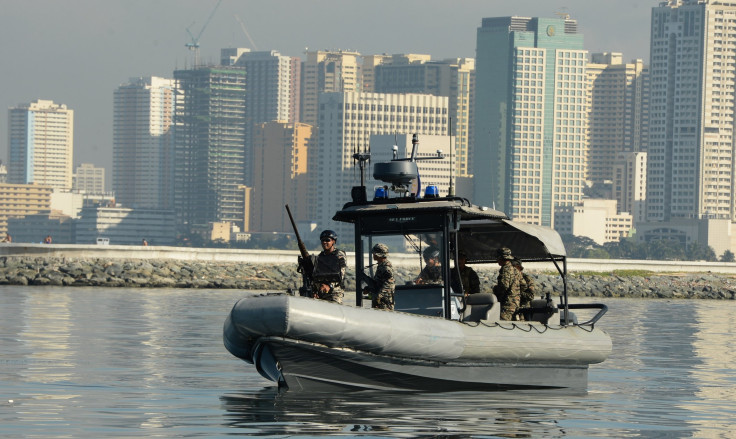Philippines Seeks Coordinated Naval Patrols With Indonesia, Malaysia After Abu Sayaff Beheading

The Philippines is negotiating coordinated naval patrols with Indonesia and Malaysia to protect its ships from attacks and kidnappings from Islamic militants, a senior Filipino official said Thursday, according to Reuters. Philippine Foreign Secretary Jose Rene Almendras said that separate but coordinated patrols would aim to determine routes safe for travel.
Islamist rebels are currently holding 23 hostages and have demanded millions of dollars as ransom. Indonesia is trying to free about 14 of its citizens, who were taken from tugboats by rebels from the extremist group Abu Sayyaf from southern Philippines. The hostages also include citizens from Malaysia, Netherlands, Japan, Norway and the Philippines. On Monday, Abu Sayyaf militants beheaded a Canadian hostage, prompting Philippine President Benigno Aquino to announce that security forces would bolster efforts to beat the group.
Last week, Indonesia called for joint maritime patrols with the Philippines and Malaysia that would involve ships from the three countries patrolling together and crossing into each other’s territorial waters, Reuters reported. Officials from the three countries are now set to meet in Jakarta on May 5 to discuss the coordinated naval patrols.
“The issue is safety and security,” Almendras told Reuters, adding: “It's called coordinated patrols, we'll do our patrols and they will have their own patrols in their own territorial waters so there will be no more threats to the movement of ships, including the kidnapping of sailors.”
The increasing number of attacks has also affected the coal trade between Indonesia, the world’s largest thermal coal exporter, and the Philippines, which relies on Jakarta for 70 percent of its coal imports. Two Indonesian coal ports have so far blocked ships from leaving to the Philippines and Malaysia’s eastern Sabah region due to security concerns, Reuters reported.
Aquino, who praised the work of the security forces in Indonesia for their fight against Abu Sayyaf, said Wednesday: “I credit our security services for putting these threats to bed with both professionalism and discretion. The public may rest assured that they may go about their daily lives without fear or unease,” adding: “We want to continue to seriously erode any ability of the ASG (Abu Sayyaf group) to continue to function.”
He added: “Casualties are to be expected. But what has to be of utmost importance is neutralizing the criminal activities of the ASG.”
Philippines armed forces and national police reportedly said in a joint statement after the beheading that it would use the “full force of law” to “bring these criminals to justice.” It added: “There will be no let up in the determined efforts ... to neutralize these lawless elements and thwart further threats to peace and security.”
© Copyright IBTimes 2025. All rights reserved.





















